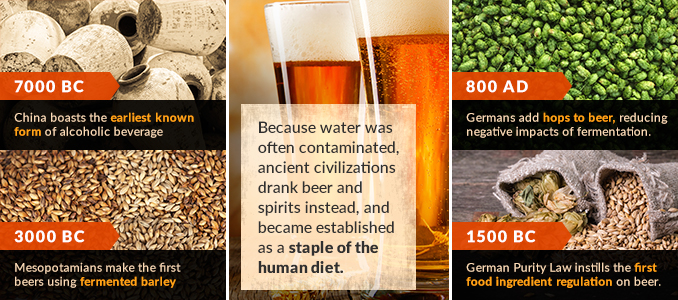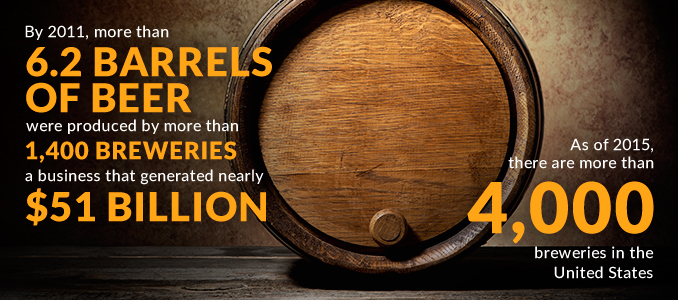Chapter 1: A Brief History of Beer — An Ancient Beverage
With a history as complex as humanity’s own, the origins of beer and spirits cannot be found in any specific culture or time period. And yet, evidence of early forms of fermented beverages exist as far back as 12,000 years, as the hunter-gatherer societies transitioned into more static, agrarian lifestyles.
Brewing Dates Back Over 7,000 Years
With the growing of crops like barley, rice, wheat and maize, the evolution of fermented beverages can be found in countries like China, which boasts the earliest known form of alcoholic beverage, dated to nearly 9,000 years ago. However, the first beers made with fermented barley likely originated in ancient Mesopotamia more than 5,000 years ago. The Sumerians even had an ode to a one of their goddesses, the “Hymn to Ninkasi” — a revered recipe attributed to the Sumerian goddess of beer.
While beer may not seem like a healthy food choice among today’s sugary drinks and abundant, calorie-rich foods, beer and spirits have offered a safe alternative to the water of ancient civilizations, which were often contaminated, and have long been a staple of the human diet. As the centuries continued, evidence of brewing performed by the Babylonians, Egyptians and eventually the Romans shows how this simple alcoholic beverage evolved with societies around the world, as it continues to do today.

From there, Christian monks living in monasteries were the brewmasters of their day, but even in the Middle Ages, the recipe we see today had not yet been invented. Bitters were added in the form of other botanicals, but hops would not find their way into the brewing process until much later, when the Germans began experimenting with them in the early Ninth Century AD. As spoiling was common for many food products of the time, hops eventually became a popular ingredient because they reduced the negative impacts of fermentation, and eventually found their way into breweries across Europe and Britain over the next few centuries.
Since beer was such an important part of civilized life, the beverage boasts the first food ingredient regulation in history, when the German Purity Law, or Reinheitsgebot, dictated that beer could only be brewed from water, malt and hops in the 1500s. Yeast, now the main fermentation ingredient in beer, wasn’t added to the recipe until later.
History of American Beer
Brewers had become an important part of European society, and their influence naturally became a prominent staple in the newly formed colonies of North America. Even many of the United States’ founding fathers were no strangers to the brewing process. General George Washington even had his own recipe for a proper brew. In 1789, Washington refused to drink any porters not crafted on American soil, leading to the state of Massachusetts passing an act to encourage the production and consumption of American beer.
While federal sentiments toward liquor and beer changed in the early 1900s during the prohibition era, strict regulations did little to slow down people’s desire to partake in alcoholic beverages, spawning an underground culture and advancing criminal elements within American society. With reformation underway by the 1930s, the American Brewers Association was formed and beer was flowing freely once again. In the decades that followed, the brewers of America united and breathed new life into this ancient practice.
Since the Second World War, local brewing has surged once again through the efforts of craft breweries and microbreweries, who turn out products for different markets than the largest American brewers typically cater to. By 2001, more than 6.2 barrels of beer were produced by more than 1,400 breweries, a business that generated nearly $51 billion at the time. As of 2015, there are now more than 4,000 breweries in the United States.
Throughout the centuries, the processes of brewing and distilling fermented beverages have undergone several changes, weathered challenges and experienced scientific innovations that have changed the world for good. Still, the ingredients that comprise beer, and even certain types of whiskey, remain relatively unchanged. The most talented and creative brewers of the world still must rely solely on Mother Nature’s bounty to craft that cold, delicious pint.
Table of Contents
- Crafting Great Beer and Spirits
- Chapter 1: A Brief History of Beer — An Ancient Beverage
- Chapter 2: Nature's Contribution — The Ingredients
- Chapter 3: The Art of Brewing and Distillation
- Chapter 4: The Tools of the Trade — Vessels, Stills, and Compressors
- Chapter 5: How to Increase Energy Efficiency in Microbreweries and Distilleries
- Chapter 6: How to Save Money in Production Line with Better Bottling Practices
- Chapter 7: The Microbrewing and Craft Beer Movement
- Chapter 8: Evolution of Crafting Beer and Whiskey


